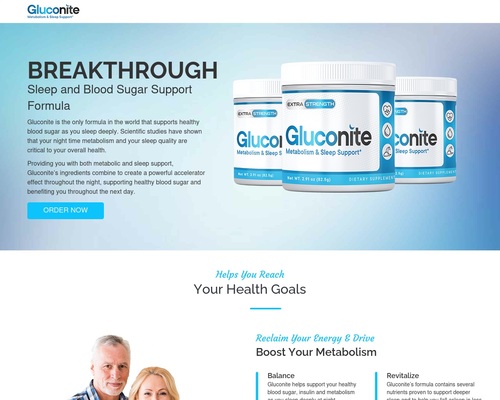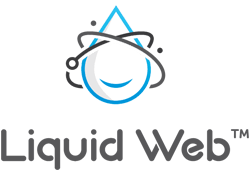
New websites are created every single day.
Competition is getting stiffer and stiffer with each passing week.
Getting your new website off the ground is one of the hardest things to do. Gaining traction takes very good search engine optimization (SEO).
The days when all you needed was to find a couple of good keywords and write a couple of blog posts are long gone. Don’t get me wrong, keyword research and quality content are still integral parts of SEO, but there’s also much more you should care about.
Now, you need to expand beyond just keywords and content.
Here are four ways to scale your new website’s search engine optimization in 2019.
1. Start With The Basics: Keywords, Content, & Usability
It is no secret that you need keyword-focused content and a site that is user-friendly to rank on Google.
According to Google themselves, content is a top ranking factor, tied with backlinks from authoritative sources.
Further, usability factors like speed are now direct ranking factors in the mobile-index world.
Without content, your website won’t appear in search results for keywords in your niche.
Without proper keyword targeting, you could be writing content that nobody is actually looking for.
Without website usability and speed, people won’t return again.
Scaling a new website requires precision accuracy on all three of these.
This should be your first step.
Why?
More content allows you to drive more organic traffic. More content helps generate more links. And if you have zero content to consume, people won’t return (let alone stay for more than 15 seconds). Plus, if your site is not optimized, people will have bad experiences.
Before you even think about publishing a piece of content… Speed, uptime, security, and usability need to be your main focus. According to Google, three seconds is the best practice for speed. 99.94% is the uptime gold standard for your web host.
If your host provider isn’t getting you at least 99.94% uptime, you need to upgrade. Seconds and minutes could result in financial loss and a damaged brand reputation.
What if your site crashes during a holiday sale? Or while receiving referral traffic? That’s not good.
And what if your host doesn’t have the right online privacy and security settings in place? That sounds like a lawsuit waiting to happen.
Improve your website speed, uptime, security, and usability before putting pen to paper.
Now, it’s time for the content. Start with a tool like Ahrefs and look for keywords that have moderate volumes and low difficulty:
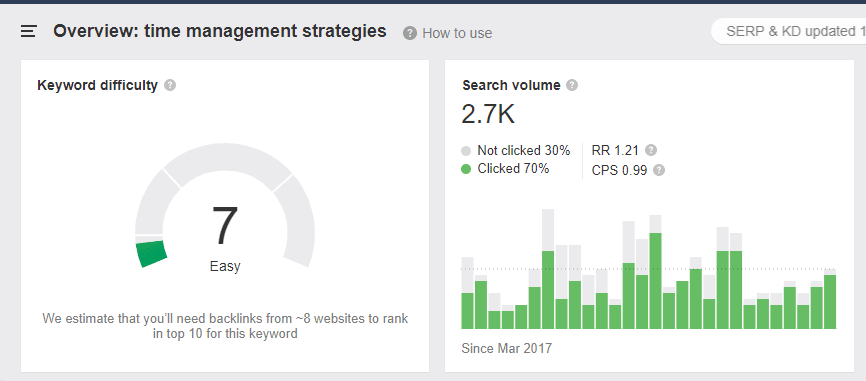
Look at the current search results for these keywords, and start to examine the top-ranking posts:
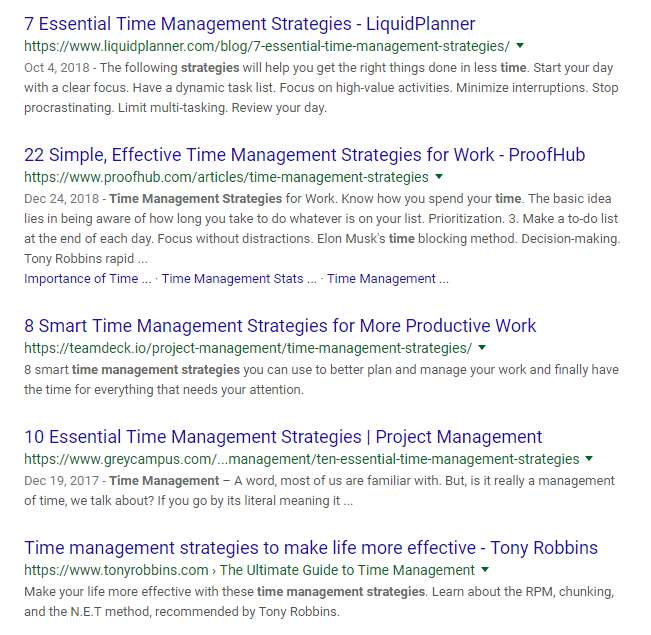
Click on each piece of content and take notes on what features these posts have.
For instance:
- Do they contain custom images?
- How long are the posts?
- What are the key sub-headers they use?
- What related keywords are they targeting?
- Do they use schema markup?
- What outbound links does it contain?
Now, make sure you hit all of these AND MORE.
Doing so ensures your post is the best on the SERPs (search engine results pages).
Repeat this process for your top keywords.
2. Start Guest Blogging to Build Brand Awareness
Building brand awareness is one of the biggest impacts in the early stages of a website.
One of the first things people look for in search results is a familiar brand.
And it makes sense:
Why click on site X when they know and already trust site Y for information?
They won’t.
This is bad news for you. But, you don’t have to sit idly by and watch your clicks go to a competitor.
Instead, you need to start building brand awareness from the ground-up.
How?
Targeted guest posting.
Start looking for websites in your niche that accept contributor content:
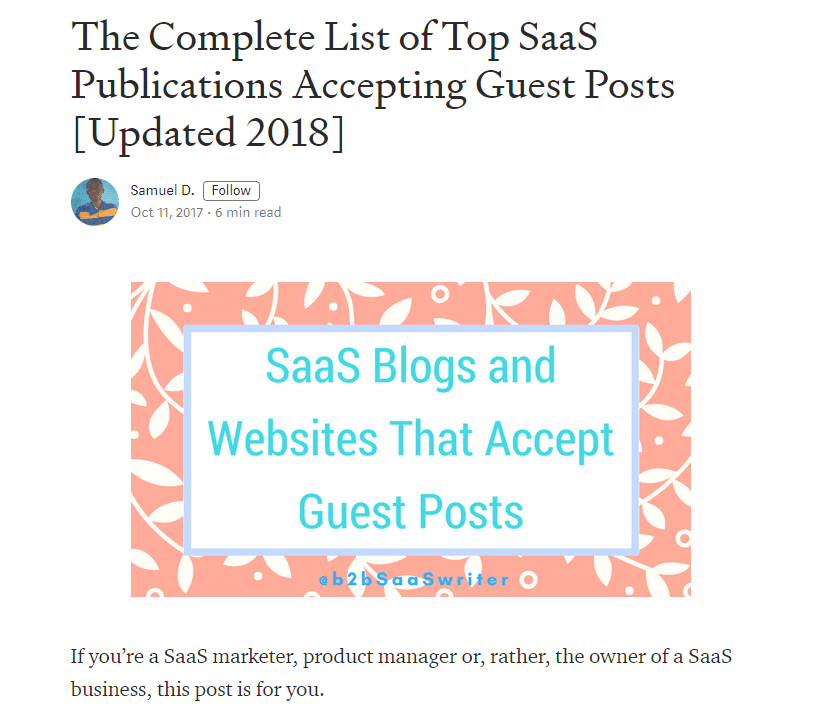
There are countless round-up posts like this in almost every niche.
But, don’t just apply to guest post at any site. Pick your targets wisely.
Plug site targets into Ahrefs again and look at their domain authority and traffic metrics:

Do they have a strong domain authority (50+)? Do they have real organic traffic, like Liquid Web?
If so, add them to a list of sites that you want to guest post for and start reaching out.
Take Eterneva for example, a company turning ashes into diamonds:

They regularly guest blog on other niche sites in the grief industry and other sites their target audience hangs out.
The final key to guest posting is to apply with content that isn’t generic. Content that is new to their site. Cover topics they haven’t, and share a unique perspective that will drive people back to your site.
Check out these unconventional content marketing tips to get more insight on how to win at content marketing once and for all.
Long story short… If your content is boring, you won’t get much traction from guest posts.
3. Develop Link-Magnet Content
Generating backlinks is a key way to scale your website.
Backlinks from reputable sites show that your site has good information. On top of that, they will drive visits from your target market.
But getting backlinks in 2019 is a shot in the dark…
…unless you are developing content that grabs attention.
As marketing expert Jeremy Moser says on SEJ:
Most keyword-driven content is overcrowded by titans of industry who’ve been crafting brand awareness and thought leadership for the last decade.
In simpler terms:
Not just any content will generate links when you are a new website with no branding.
As Shane Barker says, the best approach for off-page SEO combines a quality backlinking strategy with unique and shareable content.
You need memorable content that people won’t forget.
For example, Codeless’ Content Writing Services study, comparing the top content services in a 13,000 word, ultimate breakdown:
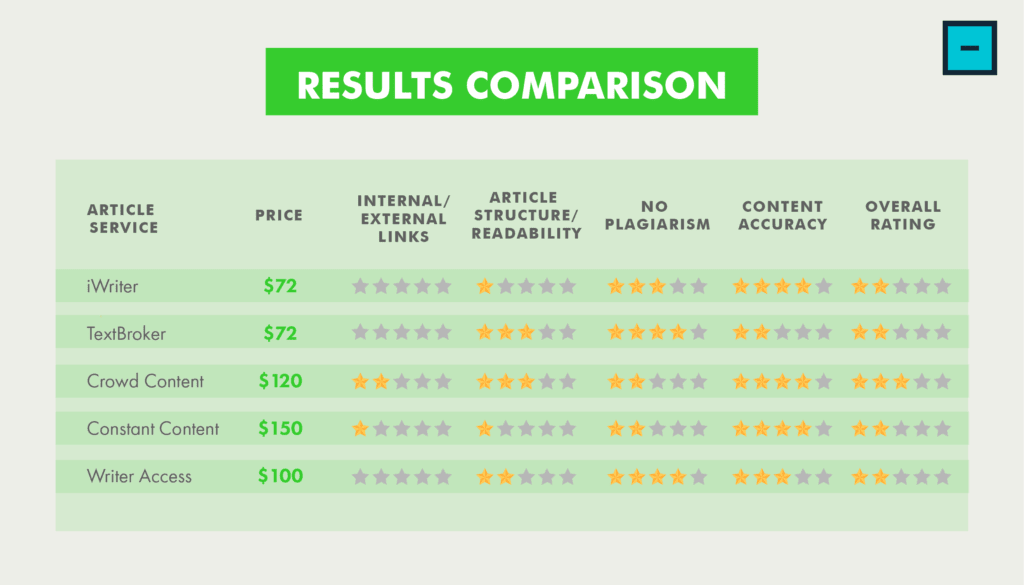
Now that is original research! Content that takes time, effort, and generates results.
Still need some ideas on what it takes to get that juicy shareable content? Here’s a few suggestions to implement in your content marketing strategy, according to Alex Birkett:
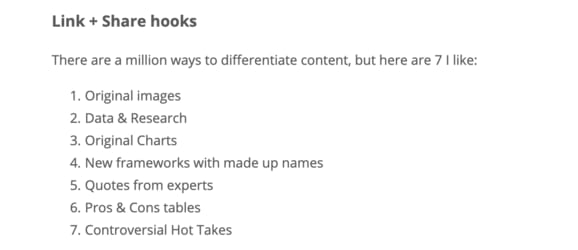
4. Form Real Relationships and Partnerships
Once you’ve built a foundation for your new website with original content and guest posts, the real work comes into play:
Growing your social traffic.
Forming partnerships and relationships with others in your industry who can help you grow (and who you can help grow, too).
Start connecting with people on social media who might be in the same position as you.
Don’t forget that podcasting is red hot right now and if you’re looking to start a podcast, it’s a great way to get connected with others in your industry.
If you need a tool to streamline your engagement process across all platforms, consider a tool like SocialPilot to make your life easier.
Just one thing when engaging…
Don’t attempt to partner with industry giants just yet, they will see right through you.
Instead, focus on connecting with former partners in your space. People who share the same outlook or who also just launched a business.
Build your network, promote their content, and they will do the same for you.
Final Thoughts
Getting traffic via organic search to your new website in 2019 is no easy accomplishment.
More competition makes standing out harder than it has ever been.
To combat this, you have to go beyond content and keywords.
Let’s not forget that 2019 is becoming the year of omnichannel marketing and customers are active across multiple platforms and mediums, making it essential to provide an omnichannel customer experience.
Those are the basics, the entry-level requirements. From there, you need to expand into guest blogging, link-magnet content, purposeful email marketing strategies to scale your guest blogging outreach, and developing real partnerships that can help you scale and reach the right audiences.
Otherwise, your content is just content that nobody will see and what’s the point in that?
Building a new site? Just getting started?
Try Liquid Web’s Managed WordPress. No overage fees, traffic limits or metered pageviews. Liquid Web’s Managed WordPress is the perfect place to start when building your new website. Plans start as low as $29/mo for one site. See all the plans!
[ad_2]
Source link


